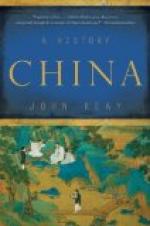In 221 B.C. Shih Huang-ti had become emperor of all China. The judgments passed on him vary greatly: the official Chinese historiography rejects him entirely—naturally, for he tried to exterminate Confucianism, while every later historian was himself a Confucian. Western scholars often treat him as one of the greatest men in world history. Closer research has shown that Shih Huang-ti was evidently an average man without any great gifts, that he was superstitious, and shared the tendency of his time to mystical and shamanistic notions. His own opinion was that he was the first of a series of ten thousand emperors of his dynasty (Shih Huang-ti means “First Emperor"), and this merely suggests megalomania. The basic principles of his administration had been laid down long before his time by the philosophers of the Legalist school, and were given effect by his Chancellor Li Ss[)u]. Li Ss[)u] was the really great personality of that period. The Legalists taught that the ruler must do as little as possible himself. His Ministers were there to act for him. He himself was to be regarded as a symbol of Heaven. In that capacity Shih Huang-ti undertook periodical journeys into the various parts of the empire, less for any practical purpose of inspection than for purposes of public worship. They corresponded to the course of the sun, and this indicates that Shih Huang-ti had adopted a notion derived from the older northern culture of the nomad peoples.
He planned the capital in an ambitious style but, although there was real need for extension of the city, his plans can scarcely be regarded as of great service. His enormous palace, and also his mausoleum which was built for him before his death, were constructed in accordance with astral notions. Within the palace the emperor continually changed his residential quarters, probably not only from fear of assassination but also for astral reasons. His mausoleum formed a hemispherical dome, and all the stars of the sky were painted on its interior.
3 Frontier defence. Internal collapse
When the empire had been unified by the destruction of the feudal states, the central government became responsible for the protection of the frontiers from attack from without. In the south there were only peoples in a very low state of civilization, who could offer no serious menace to the Chinese. The trading colonies that gradually extended to Canton and still farther south served as Chinese administrative centres for provinces and prefectures, with small but adequate armies of their own, so that in case of need they could defend themselves. In the north the position was much more difficult. In addition to their conquest within China, the rulers of Ch’in had pushed their frontier far to the north. The nomad tribes had been pressed back and deprived of their best pasturage, namely the Ordos region. When the livelihood of nomad peoples is affected, when they are threatened with starvation, their tribes




